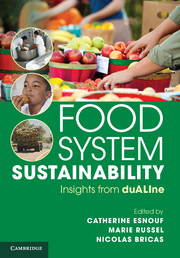Book contents
- Frontmatter
- Contents
- Foreword
- Acknowledgements
- Introduction
- 1 Context: new challenges for food systems
- 2 Consumption and consumers
- 3 Carbon footprint and nutritional quality of diets in France
- 4 Food systems
- 5 Industrial organisation and sustainability
- 6 Urbanisation and the sustainability of food systems
- 7 Losses and wastage
- 8 International trade, price volatility and standards for sustainability
- 9 Elements for a foresight debate on food sustainability
- 10 A critical panorama of methods used to assess food sustainability
- Conclusion
- References
- List of abbreviations
- List of duALIne experts
- Index
9 - Elements for a foresight debate on food sustainability
Published online by Cambridge University Press: 05 April 2013
- Frontmatter
- Contents
- Foreword
- Acknowledgements
- Introduction
- 1 Context: new challenges for food systems
- 2 Consumption and consumers
- 3 Carbon footprint and nutritional quality of diets in France
- 4 Food systems
- 5 Industrial organisation and sustainability
- 6 Urbanisation and the sustainability of food systems
- 7 Losses and wastage
- 8 International trade, price volatility and standards for sustainability
- 9 Elements for a foresight debate on food sustainability
- 10 A critical panorama of methods used to assess food sustainability
- Conclusion
- References
- List of abbreviations
- List of duALIne experts
- Index
Summary
Regional and global food systems are constantly evolving, thus the contextual elements presented in Chapter 1 are likely to evolve, and food systems will be transformed. Because it is impossible to predict the food systems of tomorrow, we have adopted a foresight approach in order to try and understand possible future changes. Our approach, which is presented in the first part of this chapter, has therefore mainly been based on identifying the main drivers of the transformation of food systems. This work was the fruit of collective discussions by a multidisciplinary group made up of some 15 experts. The plurality of their views and their areas of competence allowed them to analyse the potential impacts of the different evolutions identified relative to the sustainability of food systems in terms of their nutritional, economic, social, cultural, environmental and territorial dimensions. This step of the analysis also enabled us to highlight a certain number of points at issue, which are presented in the second part of the chapter; this does not end with a presentation of different scenarios (as might have been expected), but concludes with the three transversal messages arising from debate by this workshop: issues linked to inequalities of access to food, territorial dynamics and the governance of food systems.
Food systems evolving under the effects of various factors
Through the identification of factors underlying the transformation of food systems, it appears clearly that some trends have already been identified (see, in particular, Chapter 1 on the context and the challenges of food systems, and the retrospective analysis described in Chapter 2). Nevertheless, these trends involve a certain number of questions and uncertainties, notably regarding the nature and degree of their potential effects. These uncertainties thus open the way to contrasting scenarios for food systems throughout the world (see Figure 9.1).
- Type
- Chapter
- Information
- Food System SustainabilityInsights From duALIne, pp. 176 - 197Publisher: Cambridge University PressPrint publication year: 2013
- 3
- Cited by



